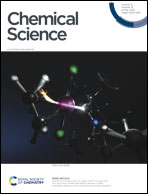Highly efficient C(CO)–C(alkyl) bond cleavage in ketones to access esters over ultrathin N-doped carbon nanosheets†
Abstract
Selective oxidative cleavage of the C(CO)–C bond in ketones to access esters is a highly attractive strategy for upgrading ketones. However, it remains a great challenge to realize this important transformation over heterogeneous metal-free catalysts. Herein, we designed a series of porous and ultrathin N-doped carbon nanosheets (denoted as CN-X, where X represents the pyrolysis temperature) as heterogeneous metal-free catalysts. It was observed that the fabricated CN-800 could efficiently catalyze the oxidative cleavage of the C(CO)–C bond in various ketones to generate the corresponding methyl esters at 130 °C without using any additional base. Detailed investigations revealed that the higher content and electron density of the graphitic-N species contributed to the excellent performance of CN-800. Besides, the high surface area, affording active sites that are more easily accessed, could also enhance the catalytic activity. Notably, the catalysts have great potential for practical applications because of some obvious advantages, such as low cost, neutral reaction conditions, heterogeneous nature, high efficiency, and broad ketone scope. To the best of our knowledge, this is the first work on efficient synthesis of methyl esters via oxidative esterification of ketones over heterogeneous metal-free catalysts.



 Please wait while we load your content...
Please wait while we load your content...